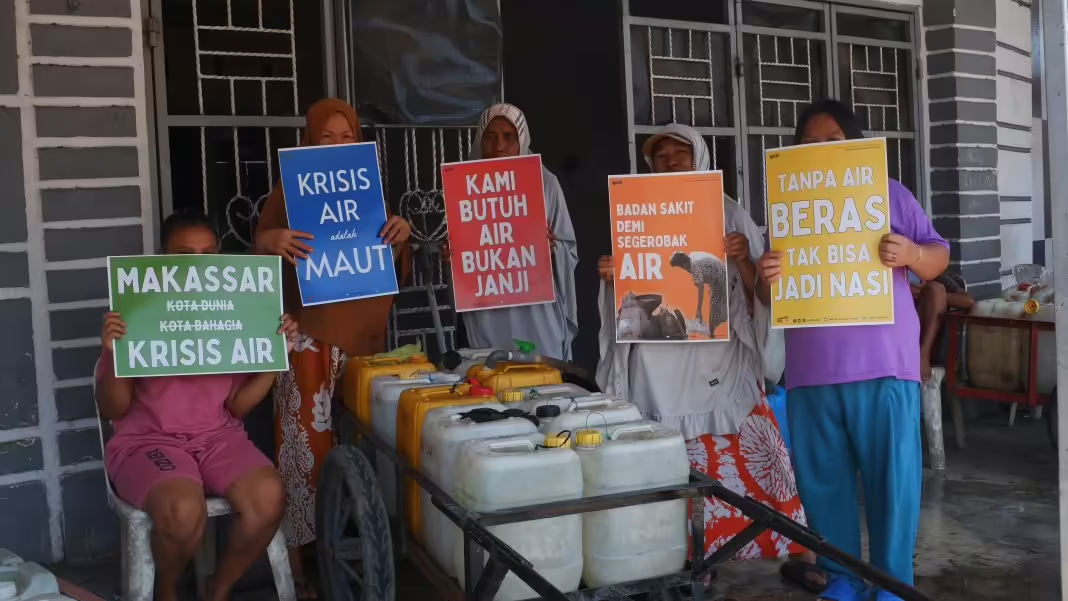The lack of clean water has significantly affected the daily lives of residents, impacting health, education, and economic activities. Women from Makassar, supported by local NGOs, have taken action to demand government intervention and a long-term solution to the water crisis.
In the past few months, the Makassar City PDAM service has been hampered by the drying up of clean water in the Lekopancing and Bili-Bili Dams. The impact of the long drought. The same incident occurred in 2023, where around 111,785 residents from 10 sub-districts were affected by the water crisis in Makassar City.
The drought experienced by Makassar City residents last year and this year has in fact been experienced by hundreds of families living in Tallo District since 2000. This means that residents living in Tallo have been experiencing a crisis and scarcity of clean water for 24 years.
The Tallo residents have tried many ways, but the government has not heard their aspirations. The proof is that until now they are still buying water for the needs of each family.
Most recently, WALHI South Sulawesi together with Tallo Women held a creative action by holding posters that read the demands of the community to the government and the Makassar City PDAM.
Hikmawaty Sabar as Head of the Women’s Involvement Division of WALHI South Sulawesi explained that the Clean Water Crisis in Tallo District is a hereditary problem that has not been resolved. Clean water is a rare commodity that is still dreamed of by the local community.
“For decades, women in Tallo, especially in three sub-districts, namely Tallo, Buloa, and Kaluku Bodoa, have been struggling to support their lives amidst the difficulty of accessing clean water. This condition has had a negative impact on other access such as economic, social, and health,” said Hikmah, accessed from the official website, Monday, September 9, 2024.
In addition to Hikmah, one of the women in Tallo who was also involved in this action explained that the residents here were tired of being promised by the government. For decades our family has had to buy clean water while our family income is not much.
“Here we only rely on rainwater and drilled water. But during the dry season the drilled water cannot be used. That’s why we have to buy water. On average, the money we spend to buy water in one cart is eight thousand to fifteen thousand rupiah a day,” said Wana, a woman in Tallo
Not only Wana, Husnaeni also expressed the same concerns regarding the water crisis they are experiencing by saying that the water crisis we are experiencing has the potential to increase the risk of infectious diseases such as diarrhea and cholera. Then our children’s education is also hampered because children, especially girls, often have to spend time collecting water rather than going to school.
“For that, we urge the government to immediately take firm action in ensuring adequate access to clean water for all people in Tallo District as an important step to improve the health and general welfare of the community here,” she said.
After holding the action, dozens of residents from three sub-districts in Tallo District then consolidated together with the CSO network in Makassar City. Several CSO networks that attended this activity were WALHI South Sulawesi, LAPAR South Sulawesi, YLK South Sulawesi, Ma’Refat Institute, KPRM, FMN Makassar, LP3M, LBH Makassar, SP Anging Mammiri, Komunitas Kata Kerja, and Jurnal Celebes.
In the joint consolidation with the CSO network and women’s rights activists in Tallo District, Altriara Pramana Putra Basri as the Coordinator of the LAPAR South Sulawesi Advocacy Division explained that the difficulty of access to clean water experienced by the Tallo community is often used as a political commodity in electoral contests, in order to gain votes for politicians and legislative candidates. There is no seriousness at all from the government, party politicians and officials to answer this problem.
“In fact, the mandate of the constitution and the Human Rights Law is very clear, the State or the Makassar City Government has the responsibility to fulfill Basic Rights, especially the right to clean water. Because there is no logical reason for us to say that Makassar City is Heading to a World City or a Happy City if its people are still having difficulty accessing clean water for decades,” said Putra.
Finally, all CSO networks present at this meeting agreed to jointly urge the government to immediately improve the services and access to clean water that have not been enjoyed by the people in Tallo, Kalukubodoa, and Buloa Sub-districts.
“For that, we urge the Makassar City government to pay special attention and be proven with concrete actions so that residents in Tallo Sub-district can enjoy PDAM water, not just going down to conduct surveys and make promises,” concluded the Coordinator of the LAPAR South Sulawesi Advocacy Division to the media crew.



